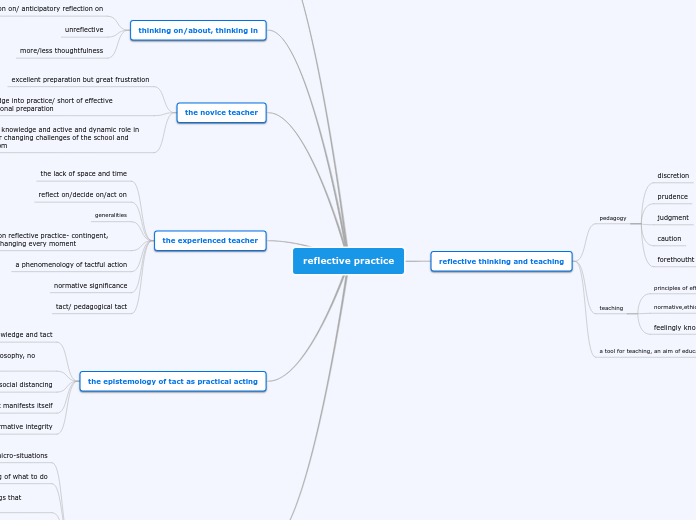作者:Rebecca Jang 6 年以前
365
reflective practice

reflective practice
the embodied and moody nature of practical knowledge
constantly critically aware
interpretable
imitative and personal relation
implicit knowing
underground action
silent knowledge
practical knowledge resides in the things that surround us
instant knowing of what to do
micro-situations
the epistemology of tact as practical acting
normative integrity
epistemological structure that manifests itself
social distancing
no social scientific facts,no moral philosophy, no teaching method
connection between pedagogical knowledge and tact
the experienced teacher
tact/ pedagogical tact
normative significance
a phenomenology of tactful action
the emphasis on reflective practice- contingent, dynamic/everchanging every moment
generalities
reflect on/decide on/act on
the lack of space and time
the novice teacher
teacher knowledge and active and dynamic role in the ever changing challenges of the school and classroom
knowledge into practice/ short of effective professional preparation
excellent preparation but great frustration
thinking on/about, thinking in
more/less thoughtfulness
unreflective
retrospective reflection on/ anticipatory reflection on
Dewey
a plan of action/ doing sonething
elaboration of the tentative hypothesis suggestions
examination, inspection exploration, analysis of all attainable considerations
conjectural anticipation and tentative interpretation
perplexity,confusion,doubt
reflective thinking and teaching
a tool for teaching, an aim of education by Dewey(1964)
teaching
feelingly know
normative,ethical,affective considerations
principles of effectiveness
pedagogy
forethoutht
caution
judgment
prudence
discretion

